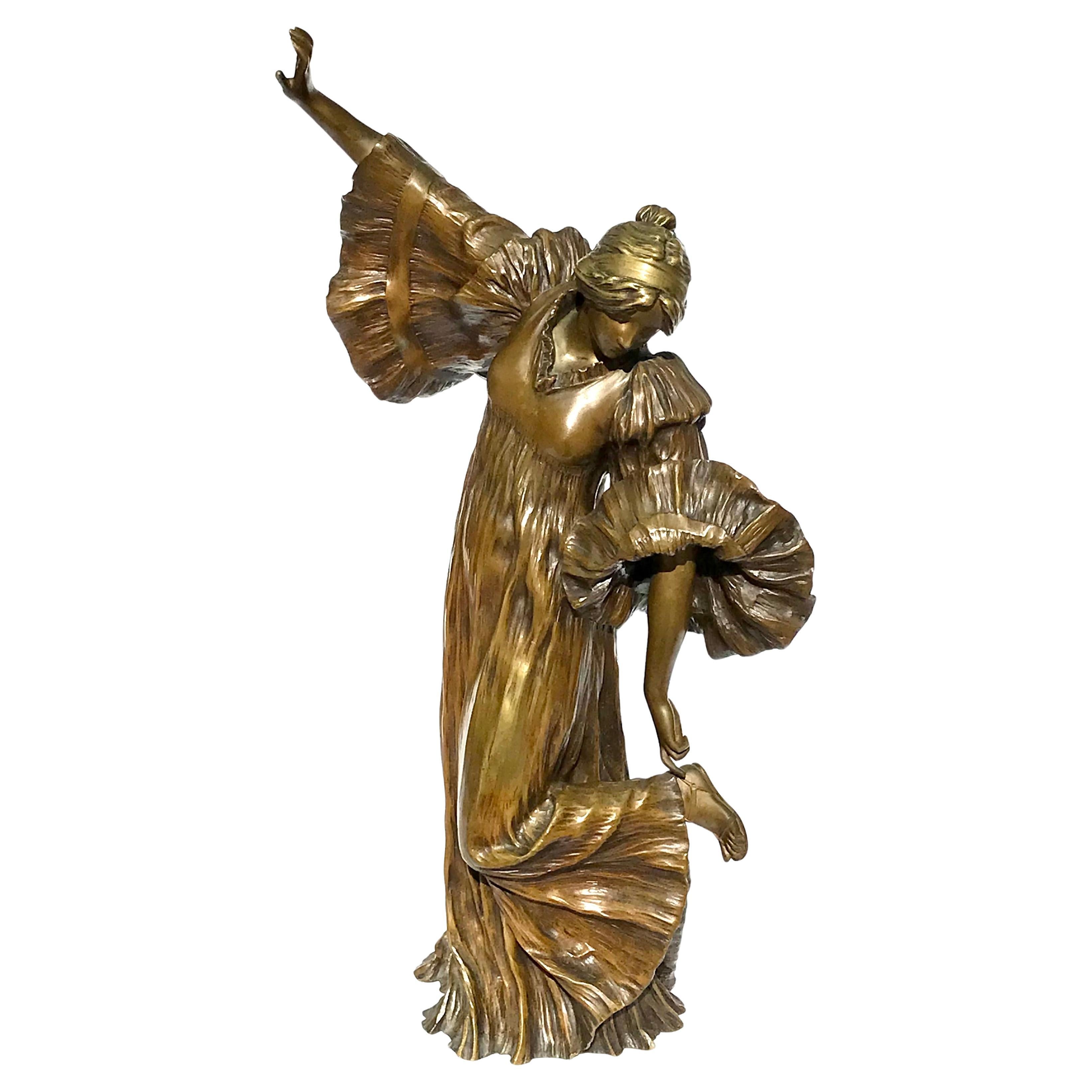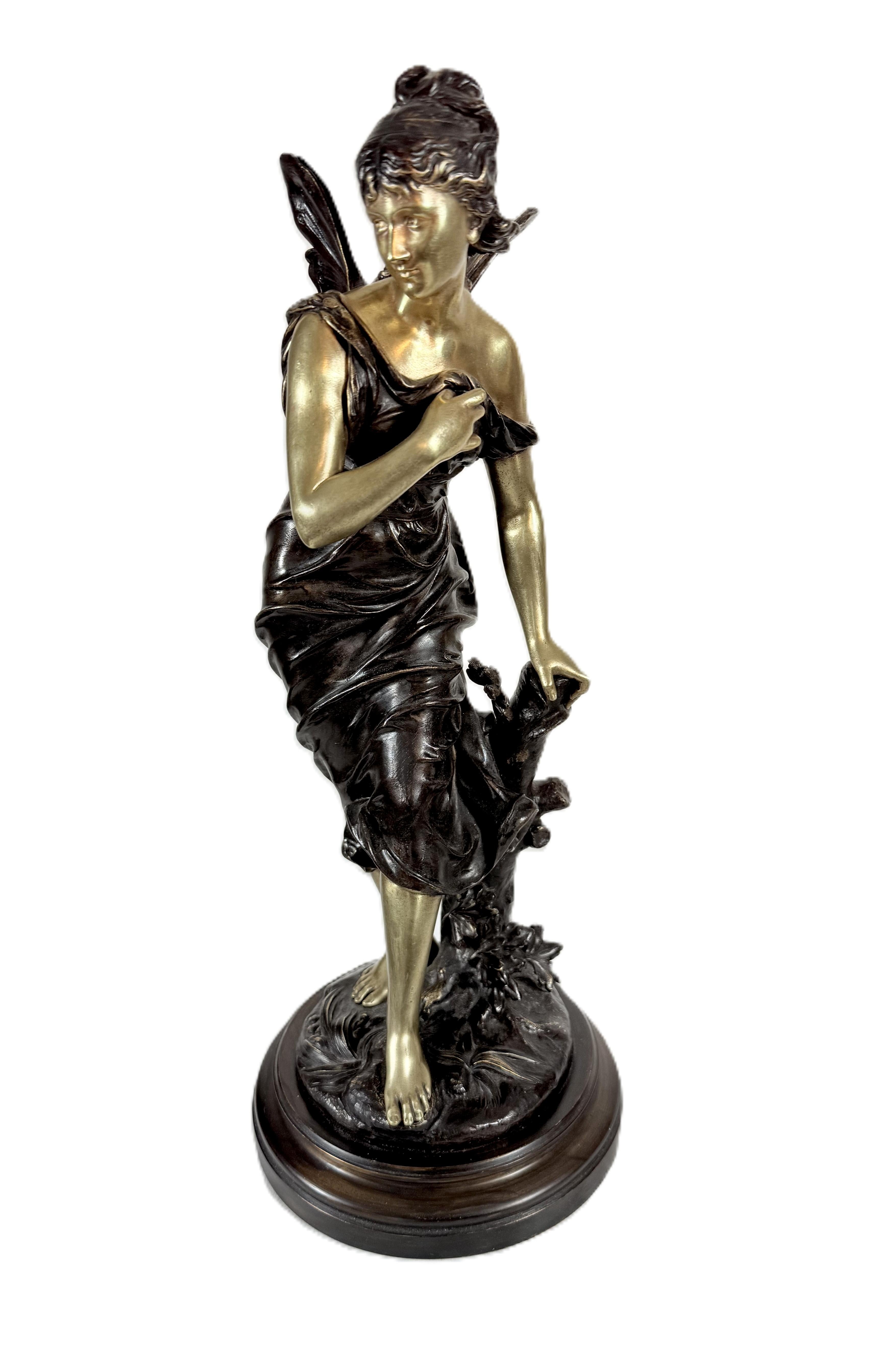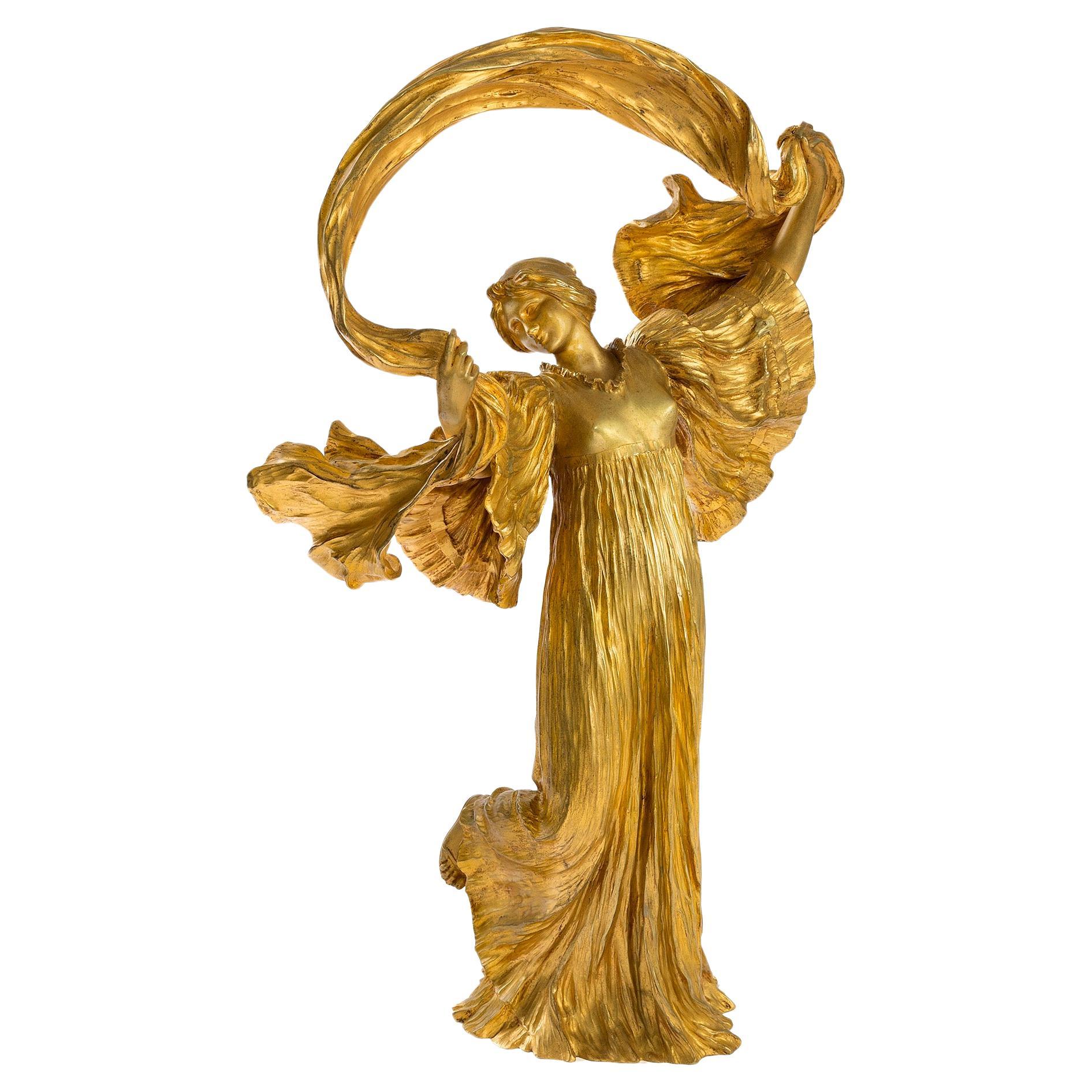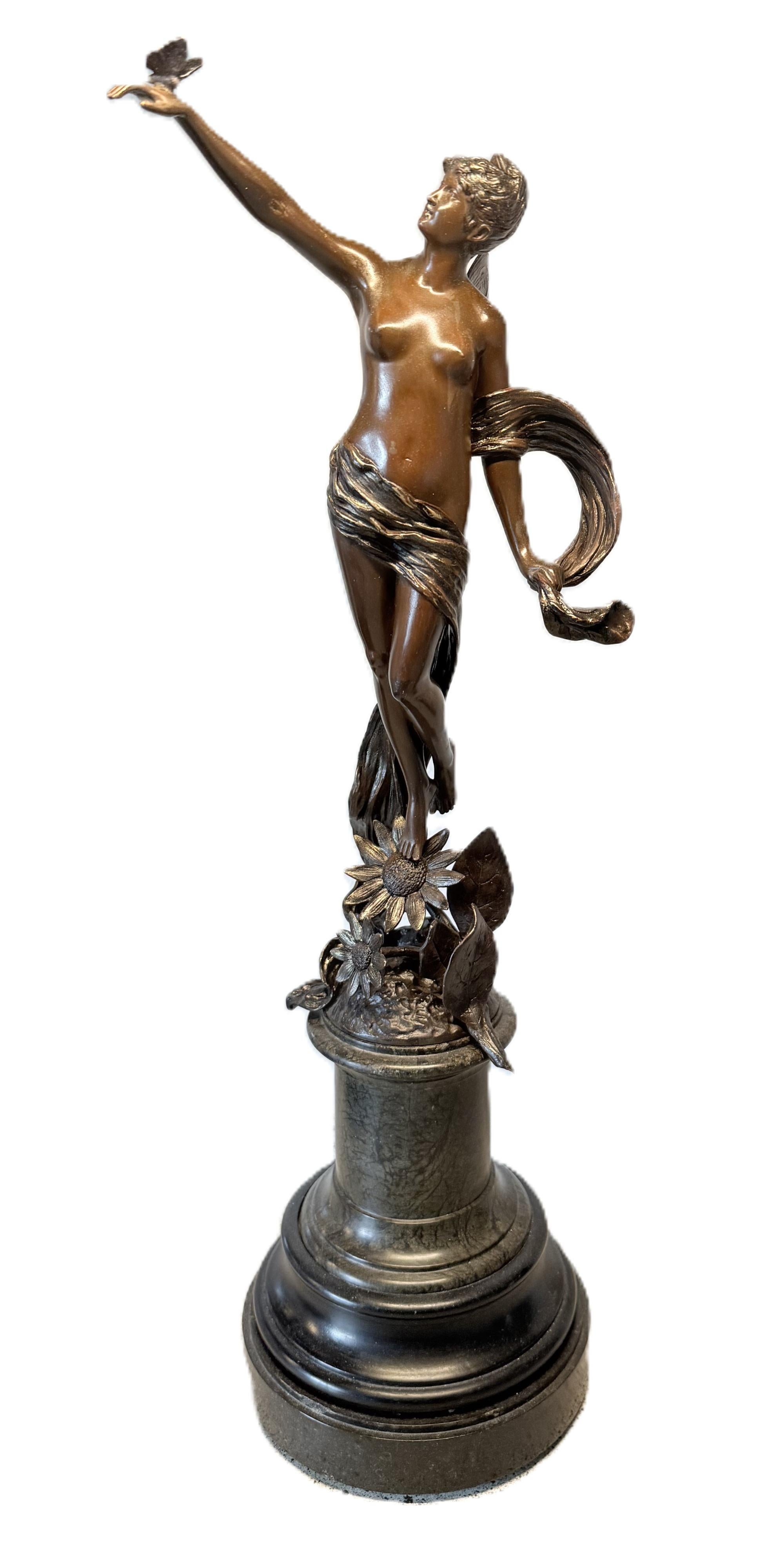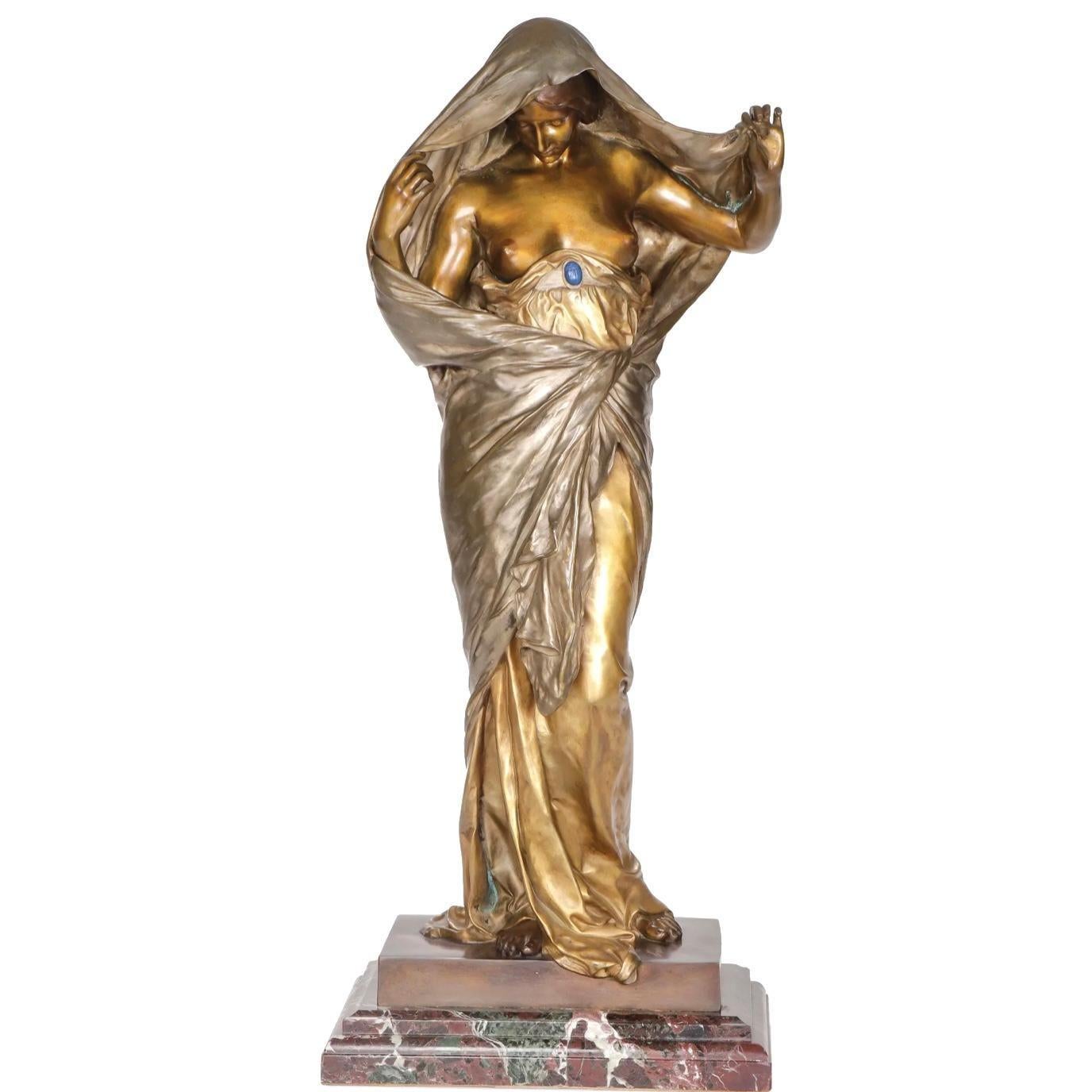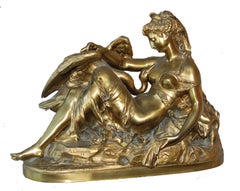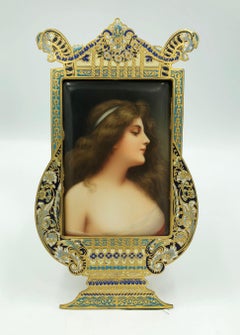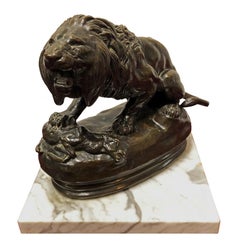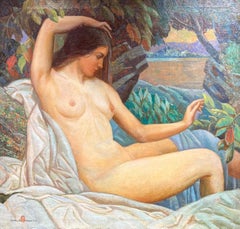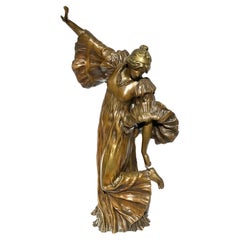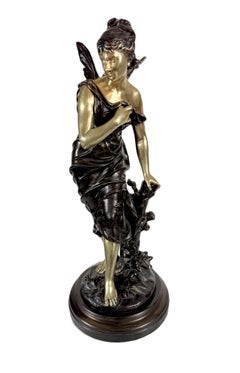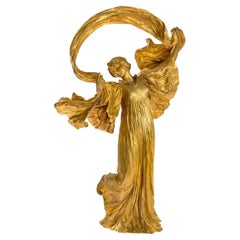Items Similar to La Cothurne
Want more images or videos?
Request additional images or videos from the seller
1 of 9
Agathon LéonardLa Cothurne1901
1901
Price Upon Request
Price Upon Request
Price Upon Request
Price Upon Request
Price Upon Request
Price Upon Request
Price Upon Request
Price Upon Request
Price Upon Request
Price Upon Request
About the Item
"La Cothurne" 1901
Gilt Bronze
Approx 21.5" High (to raised hand)
Signed and Dated
Foundry Mark "Susse Freres"
Originally modeled in white biscuit porcelain this Greek dancer is a from a set of eight created for a dining table. They were immediately successful when they were exhibited in the Sevres pavilion at the 1900 Exhibition. Individual figures could be ordered and "La Cothurne" proved the most popular. Their success led to the firm of Susse buying the right to cast versions in metal.
Agathon Leonard (1841-1923) is one of the well-known French Art Nouveau sculptors. Born in Lille in 1841, he first studied there before moving to Paris where he studied at the Ecole des Beaux Arts under Eugene Delaplanche.
He gained recognition at the annual Expositiones Universelles, winning a Silver Medal there in 1889 and gold in 1900. His most important piece, Jeu L'echarpe, was the best known series of Sevres production at the turn of the century and sold out at the 1900 Expo in Paris and later was given as a gift by the French Gov't to Nicholas II at the Hermitage.
His bronzes were cast at the Susse Freres Editeurs Foundry. He worked also in marble, quartz and ivory. He also produced Art Nouveau medallions, statuettes and pottery.
His work is held at the Victoria & Albert Museum, the Art Institute of Chicago, and Abbeville and Nantes Museums.
He became a member of the Societe des Artistes Francois in 1887 and the Society Nationale des Beaux-Arts in 1897. He was made a chevalier of the Legion d'Honneur in 1900.
- Creator:Agathon Léonard (1841 - 1923, French)
- Creation Year:1901
- Dimensions:Height: 21.5 in (54.61 cm)Width: 6 in (15.24 cm)
- Medium:
- Movement & Style:
- Period:
- Condition:
- Gallery Location:Missouri, MO
- Reference Number:1stDibs: LU74732666973
About the Seller
5.0
Vetted Professional Seller
Every seller passes strict standards for authenticity and reliability
Established in 1970
1stDibs seller since 2017
156 sales on 1stDibs
Typical response time: Several days
- ShippingRetrieving quote...Shipping from: Missouri, MO
- Return Policy
More From This Seller
View AllLeda and the Swan
By Albert-Ernest Carrier-Belleuse
Located in Missouri, MO
Albert-Ernest Carrier-Belleuse (French, 1824-1887)
"Leda and the Swan" c .1858
Bronze w/Gold Patina
18 x 24 x 14
Signed "A. Carrier"
Based upon a c...
Category
Late 19th Century Victorian Figurative Sculptures
Materials
Bronze
Price Upon Request
Épanouissement
By Königliche Porzellan-Manufaktur (KPM)
Located in Missouri, MO
KPM Porcelain
After Angelo Asti (French, 1847-1903)
"Épanouissement" c. 1900
With Original Gold Gilded Frame
Image Size: approx. 6 x 4 inches
Framed Size: approx. 9 x 6 inches
Eve...
Category
Late 19th Century Victorian Figurative Paintings
Materials
Porcelain, Oil
Price Upon Request
Lion and Antelope (No. 23)
Located in Missouri, MO
Alfred Barye (1839-1882)
"Lion and Antelope"
Bronze
Approx. 7.5H x 9W x 4D inches
Signed "BARYE.ALF" and Inscribed under base "NO. 23 LION AND ANTELOPE"
The son of a goldsmith, Parisian born Antoine-Louis Bayre was a sculptor of animal subjects and acclaimed, not only for his apparent skill, but as the founder of what became known as the French Animaliers School. Among his patrons were representatives of the state government and royalty including the Duke of Orleans and the Dukes of Luynes, Montpensier and Nemours.
Well compensated financially, he was able to buy the best of materials and hire the country's most skilled foundry craftsmen. The foundry he hired was owned by Ferdinand Barbedienne, and casts from this period were stamped with the letters, FB. However, he did not make a lot of money from his work because he was such a perfectionist that often he would not sell his work because he thought it was not 'quite right'. In 1848, he declared bankruptcy, and his molds and plaster casts were sold along with the copyrights.
Bayre's specialty was aroused, angry seeming wild game such as lions and tigers and elephants, but he also did equestrian groups and mythology figures. In order to do realistic depictions of animal anatomy, he spent much time at the Jardin de Plantes in Paris.
His early training was as an apprentice to a metal engraver, but being drafted in the army in 1812, ended that education. In 1832, he had established his own studio, and unique at that time was his method of cold stamping his bronze casts, so that each one had a special number. He had his first entry, The Milo of Croton...
Category
19th Century Realist Figurative Sculptures
Materials
Bronze
Price Upon Request
Bathing Beauty
By Carl Rudolph Krafft
Located in Missouri, MO
"Bathing Beauty" c. 1915
Carl Rudolph Krafft (American, 1884-1938)
Oil on Canvas
Signed Lower Left
38 x 40.25 inches
Born in Reading, Ohio, Carl Krafft...
Category
Early 20th Century Art Nouveau Nude Paintings
Materials
Canvas, Oil
Marguerite
By Königliche Porzellan-Manufaktur (KPM)
Located in Missouri, MO
Marguerite
Hand Painted Porcelain
w/crown stamp #107
Signed "Wagner"
Original Gilded Florentine Frame
approx 6 x 4 inches /approx 14 x 8 inches framed
Since 250 years, the royal sc...
Category
Late 19th Century Victorian Figurative Paintings
Materials
Porcelain, Oil
Price Upon Request
A Close Competition
By Maurice Milliere
Located in Missouri, MO
Maurice Milliere (1871-1946)
"A Close Competition" 1905
Colored Pencil on Paper
Signed and Dated Lower Left
Site: approx. 35 x 36 inches
Framed: approx. 43 x 35 inches
Born at Le Havre in Normandy on 12th December 1871, Millière began his art education in his home town but soon transferred to l'Ecole des Beaux-Arts in Paris, where he studied portraiture, life drawing and figure painting in the atelier of Leon Bonnat, whose pupils included Toulouse-Lautrec and Raoul Dufy. He also studied at l'Ecole des Arts Decoratifs. His skill as a draughtsman translated quickly into success as a cartoonist and illustrator and his brilliant interpretation of the "Modern Parisienne" soon became known as the "Petite femme...
Category
Early 1900s Art Nouveau Figurative Drawings and Watercolors
Materials
Paper, Color Pencil
Price Upon Request
You May Also Like
French Art Nouveau Bronze
Located in Berlin, DE
Bronze
72 cm
signed
Height: 72 cm.
Base diameter: approx. 22 cm.
Signed "E. Drouot". Stamped "BD Fondeur, Paris". Plaque engraved "Hebe Par Drouot (Hors Concours)".
Bronze, cast, ...
Category
Late 19th Century Art Nouveau Figurative Sculptures
Materials
Bronze
Agathon Leonard (Fr 1841-1923 Danseuse Au Cothurne
By Agathon Léonard
Located in Dallas, TX
AGATHON LÉONARD (FRENCH, 1841-1923) Danseuse au Cothurne
Signed 'A Léonard' (on reverse) with Susse Frères foundry cachet, further stamped 'M'
Gilt Bronze, light brown patina
21 i...
Category
Antique Early 1900s French Art Nouveau Figurative Sculptures
Materials
Bronze
Eutrope Bouret (1833-1906) Psyché
By Eutrope Bouret
Located in Berlin, DE
Eutrope Bouret Bronze
Spyche
Eutrope Bouret (French, 1833-1906)
Late 19th century.
Signed on the base
Bouret (French, 1833–1906) was an important 19...
Category
19th Century Jugendstil Figurative Sculptures
Materials
Bronze
Agathon Léonard Bronze Sculpture, series Jeu de l’echarpe
By Agathon Léonard
Located in New York, NY
Agathon Leonard's Jeu de l’echarpe recalls the poses of the legendary eighteenth-century muse, Emma Hamilton. Beloved by society artists George Romney and Elisabeth Vigee-Lebrun, pai...
Category
Early 20th Century French Art Nouveau Figurative Sculptures
Materials
Bronze
French Art Nouveau bronze by Franz Rosse 1893
Located in Berlin, DE
A late 19th-century French bronze sculpture titled "Fairy with Butterfly" by Franz Rosse (1858-1900), signed and dated "Frosse 93" on the base, depicting a semi-dressed woman floatin...
Category
1890s Jugendstil Figurative Sculptures
Materials
Bronze
Louis Ernest Barrias Nature Revealing Herself
By Louis Ernest Barrias
Located in Dallas, TX
Louis Ernest Barrias (French 1841-1905)
Nature Revealing Herself
La Nature se dévoilant devant la Science
Gilt, and silver patinated bronze with blue glass scarab
Signed on base “E...
Category
Early 1900s Art Nouveau Figurative Sculptures
Materials
Bronze
More Ways To Browse
Nicholas Ii
Porcelain Dancer
Greek Dancing
Leonard Bronzes
Eugene Delaplanche
Agathon Leonard
Michelle Gregor
Miguel Guia Calm And Silence
Miguel Guia Sculpture
Miguel Guia
Nam Tran
Nathan Rapoport
Native American Rock Art
Nicolas Valabregue
Peter Max Acrylic Sculpture
Picasso Assiettes
Picasso Fish Bowl
Picasso Medallion
